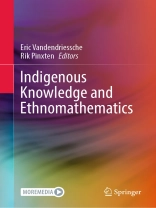The book presents a series of ethnographic studies, which illustrate issues of wider importance, such as the role of cultural traditions, concepts and learning procedures in the development of formal (or mathematical) thinking outside of the western tradition. It focuses on research at the crossroads of anthropology and ethnomathematics to document indigenous mathematical knowledge and its inclusion in specific cultural patterns. More generally, the book demonstrates the heuristic value of crossing ethnographical, anthropological and ethnomathematical approaches to highlight and analyze—or 'formalize’ with a pedagogical outlook—indigenous mathematical knowledge.
The book is divided into three parts. The first part extensively analyzes theoretical claims using particular ethnographic data, while revealing the structural mathematical features of different ludic, graphic, or technical/procedural practices in their links to other cultural phenomena. In the second part, new empirical studies that add data and perspectives from the body of studies on indigenous knowledge systems to the ongoing discussions in mathematics education in and for diverse cultural traditions are presented. This part considers, on the one hand, the Brazilian work in this field; on the other hand, it brings ethnographic innovation from other parts of the world. The third part comprises a broad philosophical discussion of the impact of intuitive or 'ontological’ premises on mathematical thinking and education in the light of recent developments within so-called indigenously inspired thinking. Finally, the editors’ conclusions aim to invite the broad and diversified field of scholars in this domain of research to seek alternative approaches for understanding mathematical reasoning and the adjacent adequate educational goals and means.
This book is of interest to scholars and students in anthropology, ethnomathematics, history and philosophy of science, mathematics, and mathematics education, as well as other individuals interested in these topics.
Spis treści
Introduction to “Indigenous Knowledge and Ethnomathematics”.- Creating ‘Evocative Images’ sunannguanik iqqaigutinik: Procedural Knowledge and the Art of Memory in the Inuit Practice of String Figure Making.- Modeling of implied strategies of Solo expert players.- Sand Drawing versus String Figure Making: Geometric and Algorithmic Practices in Northern Ambrym, Vanuatu.- Indigenous School Education. Brazilian Policies and the Implementation in Teacher Education.- Indigenous Mathematical Knowledge and Practices. State of the Art of the Ethnomathematics Brazilian Congresses (2000-2016).- Subverting epistemicide through ‘the commons’: Mathematics as re/making space and time for learning.- The Tapestry of Mathematics – Connecting Threads: A Case Study Incorporating Ecologies, Languages and Mathematical Systems of Papua New Guinea.- Indigenous mathematics in the Amazon: kinship as algebra and geometry among the Cashinahua.- The Western Mathematic and the Ontological Turn: Ethnomathematics and Cosmotechnics for the Pluriverse.- Conclusions to “Indigenous Knowledge and Ethnomathematics”. Some lines of possible further research in ethnomathematics.
O autorze
Eric Vandendriessche is an ethnomathematician, researcher at the French National Centre for Scientific Research (CNRS), member of the Science, Philosophy, History laboratory (CNRS & University of Paris). He has published ethnomathematical research aiming at studying the mathematical character of different technical/procedural activities (string figure-making, sand drawing, mat making) as they are practiced in Melanesian societies. He has also published historiographical research. Recently, he coordinated the “Encoding and Transmitting Knowledge with a String: a comparative study of the cultural uses of mathematical practices in string figure-making (Oceania, North & South America)” (ETKno S, 2016-2021) research project, supported by the French National Research Agency (ANR).
Rik Pinxten has worked as an anthropologist with the Navajo Indians of Arizona/New Mexico in the USA, on spatial knowledge in the language and in cultural practices. He developed a Navajo curriculum book for geometry teaching in primary school. With thoroughly comparative work on knowledge and studies in ethnomathematics, he has produced a synthesis on the use of anthropological studies in mathematics education. He has also published on epistemology and anthropology of knowledge. He is an activist and an academic.












